Get a free Auto Insurance quote from 20+ Canadian insurers
Hundreds of websites on the Internet perpetuate insurance myths. In this article, we have summarized all the insurance myths we are aware of and catalogued them by type, starting with home insurance, followed by auto insurance, life Insurance etc. If interested, you can unlock another 20 additional insurance myths at the end of our article. Enjoy!
Home Insurance Myths
|
MYTH |
TRUTH |
|
|
1 |
You must have home insurance. |
|
|
2 |
If I have a home insurance policy, I am protected against sewer backup. |
Sewer backup damage occurs when the sanitary and storm sewer systems cannot handle high volumes of water, which causes water to back up into your home through toilets and drains. As is the case with freshwater flood protection, most providers offer some sort of OPTIONAL sewer backup protection, but it is not usually included on default standard insurance policies. Just a few providers include it in their standard home insurance policies. |
|
3 |
My insurance protects me against flooding. |
It depends on the type of insurance policy you have. Typically, a home insurance policy protects you against sudden and accidental entry, or release of, water in your home (e.g. burst pipes). A standard home insurance policy often would not protect you against “overland flooding” (when water flows over normally dry land and enters your home through doors and windows, such as due to a river overflowing its banks or snow melting). Prior to 2015, flood insurance was not available in Canada at all. Instead, homeowners and renters had to rely on the disaster financial assistance programs offered by the government. Today, most home insurance providers offer some sort of freshwater flood OPTIONAL protection. A few providers, such as Square One Insurance, automatically include it in all eligible policies. |
|
4 |
If I am away on vacation, my house is covered. |
If you simply leave for vacation without taking precautions, you are not always covered. Thus, if you go away during the “usual heating season” then you usually need to either:
If you don’t take one of these two precautions, then you may not be protected against water damage resulting from frozen pipes that burst. Check with your provider to determine what length of vacation requires you to take extra precautions, such as somebody visiting your place on a regular basis in your absence. Different policies may require different frequency of those visits, but in general it is every 3-7 days. |
|
5 |
If I have valuables, they are covered. |
A standard home insurance policy covers your personal property and most valuables up to the selected limit of insurance. It’s important to note that sub-limits often apply to specialty property, like jewellery or furs. For these items, you have the option of adding coverage to your policy. Often, you will need to provide proof of value (e.g. an appraisal or a receipt). |
|
6 |
My home insurance only covers the house. |
Home insurance policies cover your house and its contents. They also cover any detached structures on the property, additional living expenses you may incur if the house is uninhabitable, and personal liability exposures you may face. For condos, policies also cover unit owner improvements and some assessments made against you by the condo corporation. Make sure that you have a thorough understanding of what it covers. Our overview of condo insurance (including quoting) will explain the details of condo insurance coverage. |
|
7 |
Home insurance covers the market value of my house. |
Home insurance does not cover market value, only the rebuilding or replacement value of your house. If your house burns down, the purpose of home insurance is to cover the costs required to re-build the house as it was before the loss. Rebuilding value is typically lower than market value because it does not include the value of the land. Back to the example of your house burning down, the land is still there so your insurance does not need to “replace” the land. An insurance policy can often include costs to clean up the debris, such as after a fire. |
|
8 |
Home insurance pays for required upgrades/maintenance. |
No. Usual wear and tear will not be covered by your home insurance. That is different from an actual insurance event such as damage from hail or storm winds. |
|
9 |
Home insurance automatically covers upgrades to the home or condo. |
Home insurance will not automatically cover your kitchen, washroom or other upgrades. Typically, you must advise your insurance provider of these upgrades when they happen. You need to find out how your policy treats upgrades and, eventually, add them to the policy. |
|
10 |
Home insurance covers earthquakes. |
Your home insurance covers earthquake damage ONLY if you purchased an “earthquake rider” on your policy. These are mostly meaningful in British Columbia and Quebec. Some providers, like Square One Insurance, automatically include earthquake protection in their policies. |
|
11 |
It is fine to overstate the value of the damage. |
Overstating the value of damage is a dangerous thing to do. That’s because your insurance provider will conduct their own assessment/ investigation to check your claim. If they determine that you were overstating your claim, your entire claim can be denied and your policy can be cancelled. You risk ruining your credibility and your ability to get home insurance elsewhere. |
|
12 |
Insurance is cheaper for older, less expensive homes. |
Insurance is normally more expensive for older houses since there is a higher chance that something will go wrong, and it will cost more for insurers to fix it. Also, many older house elements, such as plumbing, are more likely to fail than plumbing in new homes that use upgraded pipes and materials. |
|
13 |
If you cannot live in your home, your insurer will pay for you to stay in a similar home. |
You need to review your policy and the limits of insurance for additional living expenses. In some cases, you may want to stay in smaller accommodations to make your limit of insurance go further (e.g. your coverage can be limited to a particular amount, which will not allow you to stay in a hotel longer than 6 or 12 months). |
|
14 |
Insurers will substitute the lost/damaged items with new ones. |
Not always. It will depend on how the insurer defines payout amounts in the contract –based on actual cash value or replacement value. |
|
15 |
Insurance covers damages caused by termites and other insects. | Normally not. Make sure that you know how your insurance policy treats this kind of damage. |
|
16 |
Condominium corporations provide insurance that covers my condo. |
Condominium corporation insurance will cover the overall building structure, its exterior finishes, roof, windows and common areas like elevators and hallways. It does not cover the contents of your condo, its upgrades and 3rd party liability should you cause damage to other condo units (e.g. via flooding). |
|
17 |
If I am a tenant, my landlord’s insurance covers everything – it is his/her responsibility. |
No. Landlord’s insurance does not cover your liability (e.g. if you flood your neighbours) and your contents (if something is stolen from your unit). A landlord may require you to have a tenant insurance policy. |
|
18 |
All home insurance policies are the same. |
No, home policies can have significant differences in what they cover and what protection types they offer. The biggest differences you should be looking for are: handling of water damages (sewer back up, flooding etc.), the amount of coverage, and the living expenses cap. |
|
19 |
If a car is stored in a garage, it is covered by the home insurance policy. |
No, a car should be covered by the comprehensive coverage of your auto insurance policy. It will not be covered by a home insurance policy. |
|
20 |
If I make a home insurance claim, my insurance costs will go up. |
Not always, some insurance might not increase your costs after the first claim or simply eliminate your option to get a “zero” claim discount. |
|
21 |
Damage from natural disasters or Acts of God are excluded by home insurance. |
No, there is no such thing as an Act of God exclusion in home insurance policies. In fact, most policies cover damage from hailstorms, lightning, wildfires, etc. Optional coverage is available for certain types of natural disasters, like earthquakes. Other types of natural disasters, like seawater flooding or landslides, are excluded. |
|
22 |
If I get in a fight with someone and they sue me, my home insurance will defend me and cover any costs. |
No, the personal liability protection included in your policy only covers accidental and unintentional injury of others or damage to the property of others. So, if you intentionally injure someone, you’re on your own. |
|
23 |
If my dog bites and injures someone, my home insurance will not protect me. I need a special insurance policy. |
As long as you properly answered any questions relating to your pets in the application and investigation process, then your policy will cover costs associated with your dog biting and injuring a third party. |
|
24 |
If my child goes away to college or university, all their belongings are fully covered. |
Not necessarily. Most insurance providers limit the amount of coverage for a student’s property while living on campus. (Square One is one of the few that has no sub-limit for student’s property.) If your child is renting an apartment or suite, then they must purchase a separate tenant’s insurance policy as your policy will not cover them. |
|
25 |
My belongings, left in a storage locker that I rent, are protected by my home insurance. |
Not necessarily. Most insurance providers specifically exclude personal property left in a rented storage locker (unless that locker is in the basement of the apartment building that you live in). |
|
26 |
I’m paying for home insurance, so I should make every possible claim under it. |
That’s not the best idea. First, your claims are usually subject to a deductible. So, if the loss is less than the deductible, your policy will not pay out. Next, even if the loss is marginally higher than the deductible, you will lose your claims-free discount if you file a claim. It takes at least three years before you qualify for that discount again. So, you need to look at the amount of the loss in relation to your deductible and discounts. Plus, if you make multiple claims you may be subject to surcharges and your insurance provider may refuse to offer renewal. |
Auto Insurance Myths
|
MYTH |
TRUE |
|
|
27 |
It is more expensive to insure red coloured cars. |
|
|
28 |
Insurance for two-door cars/convertibles is always more expensive. |
Insurance for convertibles is not necessarily more expensive than for other cars. What matters is the insurance history for this car category, such as theft of this car type, accident history, etc. |
|
29 |
Car insurance rates for cheaper cars are lower. |
Not necessarily – car insurance rates are dictated by the history of the car model. Insurance rates for Honda Civics, for example, are generally higher than for many other more expensive models. |
|
30 |
Changing deductibles significantly impacts your insurance rates. |
InsurEye’s analysis has demonstrated that changing your deductibles do not really impact your insurance rates. |
|
31 |
You do not have inform insurance the company if you move. |
Your location strongly impacts your car insurance rates. For example, if you move to Brampton, ON, your insurance rates will be 65% higher than provincial average. If you have not informed your insurance company about your move, it can refuse your claim. |
|
32 |
You can always be added as a second driver on your parent’s insurance policy. |
Insurers know very well about this approach to reduce insurance rates and it even has a name – “fronting”. It is considered insurance fraud and an insurer may decide to refuse your claim if you have an accident. |
|
33 |
If you lend your car, it will be covered through the insurance policy of another driver. |
No, if you lend your car, you basically lend your insurance policy. Should your car be involved in an accident, it is your insurance policy that will be covering all the damages. |
|
34 |
Insurance works in the same way across all Canadian provinces. |
No. There are several differences in car insurance across Canada: First, provinces use different insurance systems, either no-fault or tort (which is at-fault) or a mix of both. It defines whose insurance company pays for a claim and the ability of one side to sue the other. Second, a list of insurers who can provide insurance varies from province to province. In MB, SK and BC only one company per province – MPI, SGI and ICBC respectively can provide car insurance coverage. |
|
35 |
No-fault insurance means that none of the parties involved in an accident is at fault. |
Not at all. In an accident, there is always an at-fault party, or fault can be split between both parties (both are partially “at-fault”). No-fault insurance simply means that each party’s insurance company pays for an accident and not the insurer of a party who is at-fault. That results in quicker payout times since insurers do not spend time and resources figuring out who was at fault. |
|
36 |
The tort system encourages better driving behaviours since only an insurance company of an at-fault party pays. |
No, according to the Insurance Bureau of Canada, there is no correlation between the type of the insurance model used in a province and rate of accidents. So, British Columbia has a tort insurance system, but has a very high level of accidents. |
|
37 |
The no-fault system results in lower costs since it eliminates the need for expensive legal processes required to determine who is at fault. |
As an example, Ontario has a mixed system, strongly being skewed towards no-fault insurance. At the same time, it has, by far, the highest car insurance rates in Canada. |
|
38 |
Damages to your car are always covered. |
Similarly, to the previous point, the damages are only covered if you have collision coverage as a part of your policy. |
|
39 |
If you get into an accident once or get a ticket, your insurance rates will always stay high. |
Accidents and tickets stay on your auto insurance record for three years, after which you can benefit from a reduction in the rate. |
|
40 |
If I have a really bad driving record, I will not be able to get car insurance. |
You will still be able to get car insurance if you have a driver’s license, but your insurance rates will be exorbitant. You might not be able to get insurance with mainstream insurers, but will be able to get it from companies offering high-risk auto insurance (e.g. PAFCO). If you cannot get insurance from them, you will be able to get it from a special organization called Facility Association, but it will be really expensive. It is the last option for people to get car insurance if they failed to get it anywhere else. |
|
41 |
Other parties can always sue you for damages or/and injuries if you are at-fault. | It depends on the province. In some provinces, it is not possible to sue another party even if this party is at fault. |
|
42 |
If I have comprehensive coverage, I can always expect to get OEM (original equipment manufacturers) parts for my vehicle. | Not necessarily. In many cases insurers will use aftermarket and recycled parts to keep down the costs of claims. Some insurers might offer you an option of using OEM parts as an additional rider on your policy. Carefully read your insurance policy to understand what you are entitled to. |
Get a free quote
Life Insurance Myths
|
MYTH |
TRUE |
|
|
43 |
If you have health pre-conditions, you cannot get a traditional life insurance policy. |
Some health pre-conditions are less risky from insurance perspective – thus you can get a standard life insurance quote and qualify for a corresponding policy. |
|
44 |
It is not possible to get life insurance if you have serious health pre-conditions. |
There are particular types of life insurance, such as “no medical” life insurance, that does not require medical exams and, sometimes, no medical questionnaire – thus everyone can qualify. |
|
45 |
If you are single, you do not need life insurance. |
Many people get life insurance to protect their family. Even if you are single, in case of death, there will be numerous expenses and bills that your relatives/close ones must take care of for you. Life insurance will help to deal with it. |
|
46 |
Life Insurance is expensive. |
Life insurance can be very cheap. For example, a Term 10 life insurance policy for a non-smoking female of 35 years of age can cost as little as $17/month for $500,000 coverage. A free life insurance quote can always give you an idea of costs you’d need to pay. |
|
47 |
You need life insurance if you are the main breadwinner in the family. |
No necessarily. Even if you are not directly earning money in a household, in most cases there is still a significant value attached to what you do: taking care of the house, raising the kids, etc. Should anything happen to you, providing these services through a third party has a monetary cost. |
|
48 |
If your kids are independent, you do not need life insurance. |
Your death might still have a significant financial impact on your family (e.g. not fully paid off mortgage or loan, final expenses, open liabilities etc.). If you have no life insurance, these financial obligations may be a heavy burden on your family and children. |
|
49 |
Insurance brokers don’t care what product they sell to you. |
They do, both from a positive and negative side. On the positive side “good” brokers will try to find you a product that fits into your financial planning and is also within your financial possibilities. “Bad” brokers might want to sell you a more expensive product since they are rewarded based on the compensation they get from an insurer for each product sold. Typically, the more expensive the product brokers sell, the higher their compensation. Our advice is to make sure that you find a broker who cares about your financial situation more than about maximizing his or her own profits. There are many “good” brokers out there. |
|
50 |
Life Insurance is a good investment. |
This one is not always true. Some insurance products are purely insurance products and were created for protection, not investment. Other insurance products like “whole life” accumulate value over time. However, often you might still be better off getting a pure insurance product (e.g. term life policy) and wisely investing the difference. |
|
51 |
Medical exams for life insurance is a formality and you don’t have to disclose everything. |
Actually you do, because if you don’t and it is discovered out that you have not provided all the information or even lied (e.g. about smoking in the past), an insurance claim can be denied. |
|
52 |
Insurance agents and brokers are the same. |
They are not. Insurance agents work for one insurance company, get a regular salary and bonuses based on sales. Whereas an insurance broker does not work for one particular insurer and is by far more independent than an insurance agent. |
|
53 |
Your beneficiaries must pay tax on the life insurance payout (death benefits). |
No, life insurance death benefits are exempt from taxes. If your estate is the beneficiary, there is no tax, but money is subject to probate fees. |
|
54 |
Similarly, to other products (e.g. flights, hotels etc.) life insurance rates vary and you can sometimes get a better rate if you wait a bit. |
Life insurance rates typically become higher over time, so waiting will only increase your rates and adds more risk since you will not be covered during this time. Inversely, if your health or pre-conditions significantly improve and you regain your health, you can benefit from lower rates. |
|
55 |
Life insurance that renews automatically, will renew at a similar rate. |
Not necessary. Insurance policies typically renew at a higher rate (even as high as 5x an initial policy) since insurers will build in enough rate increases to account for the potential deterioration of your health. |
|
56 |
Non-health or pre-condition related lifestyles are not relevant for your life insurance rates. |
Your insurance company is also interested in other aspects of your life such as your job, travel habits, and sport affiliations, and can evaluate different cases of dangerous jobs, (e.g. stunt-person), dangerous travel destinations, (e.g. war zones) or extreme sports, (e.g. professional sky-diving). These aspects can lead to higher insurance premiums or even the refusal to cover you. |
|
57 |
If you purchased a particular type of life insurance, you are stuck with it until the end. |
It is important to know that there are products called “convertible life” insurance policies that can be converted into other types of life insurance at the end of their term. |
|
58 |
Mortgage life insurance is similar to traditional life insurance although it covers only your FULL mortgage amount. |
Mortgage life insurance only covers your OUTSTANDING mortgage amount. Meaning, that in the last years of your mortgage, you still pay the same mortgage insurance rate, even though your coverage in case of death will be only a few thousand dollars. It is also important to know that mortgage life insurance uses a blended insurance rate between smokers and non-smokers, so if you are a non-smoker you will be most likely overpaying. |
|
59 |
Your travel habits are irrelevant for your life insurance. |
Travelling to dangerous locations and war zones may lead to a negative decision on your application (or excluding coverage while you are in dangerous locations). Examples of such locations today or in the past are: Somalia, Iraq and Afghanistan. |
|
60 |
When getting life insurance, your job does not matter. |
Some occupations pose potential risks to life and limb. The riskier the occupation, the higher your premiums may be. |
|
61 |
Nobody cares about your driver’s license when you get life insurance. |
Not entirely. There is no difference if you have or do not have a driver’s license, unless you have a terrible driving history that includes a DUI. But insurers are interested if you have a private pilot’s license; in this case, your premiums will go up depending on your age and flight experience. |
|
62 |
Life insurance companies care about your health and not that of your other family members. | Insurers are as concerned about your family history as they are of yours. |
|
63 |
Canadian or not, it does not matter for life insurance. |
You can only apply for life insurance in Canada if you are a Canadian resident or citizen. Any other status does not count. |
|
64 |
Getting life insurance is complicated. |
It can be simple or it can be a bit complicated. If you have many assets and family members that depend on you, a financial assessment can be a bit complicated. It is your insurance brokers’ job to do the research for you. If you are getting “no medical life insurance”, it is extremely easy to get it. You have no medical exams and in some cases no medical questionnaire. Getting traditional or standard life insurance is not much more complicated. You just need to do a simple medical exam. A nurse will check your blood pressure, weight, and other vital signs and you must answer a set of questions. |
|
65 |
If you have group life insurance through your work, it is enough. |
Very often this plan is not enough as it does not offer high coverage such as several million dollars. At the same time, you need to consider that you might lose this plan, or it may become more expensive once you leave your job. Having an independent life insurance plan is a better idea even if you have life insurance protection from your work. |
|
66 |
All life insurance policies are basically the same. |
They are not. First, policies vary in nature. There are purely insurance policies – e.g. term life insurance, and there are policies with a cash accumulation component that allows you to accumulate wealth (investment product). Secondly, some policies are designed for those with normal and good health. Other products benefit people with worse health and medical pre-conditions though these no medical life insurance quotes are more expensive. It is important to note that some companies have more experience underwriting certain conditions, (cancer, diabetes, HIV, obesity, heart diseases). Working with such companies though an experienced broker will lead to a better outcome both from the coverage and rates perspective. |
|
67 |
Young people do not need life insurance. |
It is not always truth. Put yourself in a situation where you are not there tomorrow. Is there anyone who relies on your support and financial means? Even if there is nobody today, what about in 10 years? Will your older parents be able to maintain the same standard of living once they are retired? What happens to your property such as a condo when you are not able to pay for it? Do you want the bank to get it or do you prefer your family to receive it fully paid-off? |
|
68 |
All life insurance plans have health questions. |
Guaranteed issue plans have no health questions but the face amounts are low and the premiums are high. |
|
69 |
All term insurance policies increase in cost. | Term 100 life insurance has a level cost for life. |
|
70 |
Buying life insurance for a child makes no sense. |
Buying life insurance for a child allows the child to lock in at a low rate and the policy can be paid up in a limited number of years. |
Health Insurance Myths
|
MYTH |
TRUTH |
|
|
71 |
I do not need health insurance since OHIP or another provincial plan covers me. |
|
|
72 |
I must have health insurance. |
That is a myth somewhat opposite to the previous one. You do not always have to have health insurance. First, you might have a group health insurance policy from your employer that covers you. Secondly, it is sometimes cheaper to pay ad-hoc for medical services not covered, than to have a health insurance policy which might even not cover everything. Personal example: One year I paid around $95 per month for my health insurance ($1,140 per year) and still had to pay around $400 in additional costs (only 75% of dental work was covered). The next year, I had a similar amount of dental work and eye specialist visits as the year before but I decided to pay for everything out of pocket instead of buying insurance. It cost me around $1,300 that year compared to $1,540 ($1,140 + $400) that I had to pay the year before. But that’s a very personalized example. Your situation might be different. |
|
73 |
Once you purchased a health insurance policy, you can immediately can use it to the full extent. |
Insurers know very well that consumers prefer to save on insurance by not buying it when they are in good health, but tend to buy a policy once they need some medical services. That’s why insurers often cap the amount of benefits for the initial years, increasing them over time (e.g. 50% of benefits in year one, 65% in year two, 80% in year three and 100% in year four). |
|
74 |
Provincial health insurance plans cover me when I am travelling. |
It covers you to a very small extent. Provincial plans would pay $100 – $200 per day whereas the real medical costs that you can incur when travelling abroad can more than $10,000 per day (in U.S. hospitals). That is why you always need to consider getting travel medical insurance when travelling. |
|
75 |
If you have a medical pre-condition, you cannot get health insurance. |
That depends on a case-by-case situation. You can always get a guaranteed issue health insurance policy (which is more expensive than traditional health insurance plans). Alternatively, insurers can sometimes exclude your existing pre-condition from the list of items covered by the policy. |
|
76 |
It takes a long time to get paid for my health insurance claims. |
It depends on your insurance provider and type of the claim. Some insurers allow you to submit simple claims electronically, getting funds into your account as quickly as in 1-2 days. Other insurers might have a long claim process that can take weeks. |
|
77 |
I pay first and then submit my invoices to an insurer to get paid. |
Not necessarily. Many insurers and doctor offices have electronic submission of claims, meaning, that your doctor gets a payment directly from your insurer. (In some cases you may need to pay a part of a claim if, for example, an insurer reimburses only 75% of the claim amount.) In other cases, you would pay out of pocket and then send the invoices to your insurer. |
|
78 |
Provincial plans do not pay for regular eye examination at all. |
That is partly true. Some plans pay for some people groups (e.g. OHIP would pay for eye exams for those younger than 20 and senior policyholders older than 65). It would also cover a major annual eye exam for people between 20 and 64 years old if they have medical condition requiring regular eye exams. |
|
MYTH |
TRUTH |
|
|
79 |
Disability insurance and critical illness insurance are the same. |
|
|
80 |
Once I have critical illness insurance, I am covered in case of any critical illnesses. |
You will be covered only for those diseases that are clearly defined in your critical illness policy. |
|
81 |
If diagnosed with a critical illness listed in your policy, you will be SURELY paid the claim amount. |
Not exactly. Each critical illness comes with a precise definition, meaning if your condition is not falling within that definition, your insurance claim might be rejected. |
|
82 |
If I have a critical illness, I would need life insurance more because my chances of survival are very low. |
Even if you have a cancer, over 60% of Canadians are expected to live longer than 5 years. In case of a heart attack, over 90% of Canadians survive but in this case, you need time to recover. |
|
83 |
If my critical illness insurance covers cancer, then it covers all types of cancer. |
You need to be clear about what types of cancer are covered by your insurance policy. Not all cancer types are “equal” and so critical illness insurance treats them differently. |
|
84 |
Once I get a policy, I am immediately covered. |
Critical illness policies usually come with waiting periods. |
|
85 |
Once I am diagnosed with a critical illness, I will be immediately paid. |
Not necessarily. You need to survive the initial 30 days of the disease and only afterwards you will be paid. |
|
86 |
If I have health issues or medical pre-conditions, I cannot get critical illness insurance. |
Similarly, to life insurance, critical illness insurance comes in different forms and shapes. For some of them, also called standard critical illness, you need to pass a medical exam. Others, also called no medical critical illness insurance policies, come without medical exams and sometimes, even without medical questionnaires. That has its price – you will need to pay higher rates and your coverage will be typically capped at a lower level. |
|
87 |
All critical illness policies go up in cost. |
Some companies have a critical illness policy with a level policy for life, meaning that your costs will not go up. |
Disability Insurance Myths
|
MYTH |
TRUTH |
|
|
88 |
Disability insurance beneficiaries can file life insurance claims any time. |
Sometimes a disability insurance policy can have a deadline for claims. |
|
89 |
I do not need disability insurance; the chances of something happening to me are very low. |
|
|
90 |
My insurance at work covers me should something happen to me. |
It depends on what protection is in place. If your employer has Workers’ Compensation in place, you are offered that if you are injured in the course of your work. But you need to know, that the chances of getting disabled at work typically are lower than outside of work – your employer wants to minimize chances of you being disabled. Some sources indicate that as many as 90% of disability cases originate from outside of your workplace. If your employer also has a group disability policy in place, it covers you outside of work, but this coverage ends when you leave your employer. |
|
91 |
Workers’ compensation always pays in full for your disability. |
That is not always true. First, your company should have WSIB coverage, but that might not always be the case with smaller companies or start-ups. Workers’ Compensation can cover only a part of your earnings prior to the accident and some additional medical expenses including prescription drugs, medical treatments, chiropractic, physiotherapy, rehabilitation and training. |
|
92 |
The more disability policies you have the better – should something happen to you; you will be able to cash out all of them. |
Your disability policies are linked to your income, meaning that the value you can get from all of them is capped and will not provide you with a luxury existence. Unlike critical illness insurance policies, disability insurance policies are not “stackable”. Usually, you will be covered for a certain percentage of your income, such as 50-70%. |
|
93 |
If I have a group disability insurance policy at work, I do not need an individual disability policy. |
Although it is a great protection mechanism, you need to understand its exact conditions, what the coverage provides and the percent of your salary it covers. Many companies would also have Workers’ Compensation in place; that is another security net. Nevertheless, you need to remember that if you lose or change your job, you will be not protected – that’s where individual disability insurance kicks in. |
|
94 |
Disability insurance works similarly to life insurance – once you are disabled, you will get a lump sum. |
Disability insurance is different from life insurance or critical illness insurance. It does not pay a one-time lump sum but offers regular payments while you are disabled, substituting your income or a part of it depending on the policy you have. |
|
95 |
If I become disabled, my disability payments start immediately. |
Many disability contracts do not get paid out within the initial 120 days, since the company needs to decide on each case. |
Travel Insurance myths
|
MYTH |
TRUTH |
|
|
96 |
Provincial insurance e.g. OHIP provides enough coverage during your trips outside of Canada |
|
|
97 |
If you buy travel insurance, you are protected during your trip. |
It depends. Travel insurance is a “post-underwriting insurance product”. It means, first you get a travel insurance quote and buy an insurance policy. After you make an insurance claim, an insurer starts checking the information you have provided. If an insurer decides that the statistics you have provided about your age, health, and medical pre-conditions is not correct, your insurance claim will be declined. |
|
98 |
If you have a pre-condition, you do not have to share it with an insurer. |
Incorrect. You do have to share this information, otherwise your insurance claim, if you have one, might be declined. |
|
99 |
Your credit card has travel insurance to protect you. |
Not every credit card has travel medical insurance. Look carefully at its conditions. This Credit Card Comparison tool will help you to determine if your credit card has travel medical insurance. |
|
100 |
Your trip cancellation costs will be covered by your travel insurance if you must cancel your trip due to a medical issue. |
Not necessary. You need to make sure that your credit card explicitly covers trip cancellation due to getting sick or a personal emergency. |
|
101 |
Your trip interruption will be covered by your travel insurance due to a medical issue. |
Not necessary. Similarly, to trip cancellation, you need to make sure that your credit card explicitly covers trip interruption due to a personal emergency such as the death of a family member, requiring you to return home. |
|
102 |
If I have enough coverage, my insurance claim will be covered. |
Not always. Travel medical insurance has a list of limits for individual cases. (e.g. how much it would pay for nursing services). In some situations, unless it is an emergency, credit card providers require that you contact them prior to receiving treatment, otherwise a claim might only be partially covered. |
|
103 |
All trips abroad are covered under travel medical insurance on your credit card. |
Not necessarily. First, each travel medical insurance that comes with credit cards has a certain number of trip days it covers – it can be as low as 1-2 days or go as high as 30 days. Second, travelling to some dangerous locations like war zones or unstable countries might not be covered. You can consult the travel advice page of the Canadian Government’s website for more info on these locations. |
|
104 |
Travel Medical Insurance on my credit card always covers me. |
Not necessarily. This type of coverage is typical limited through length of coverage (e.g. maximum 15 days) and age cut-off (e.g. coverage for persons under age of 65). Seniors are often not protected through this insurance type at all. |
|
105 |
Travel rental car insurance fully covers my rental car. |
You should be careful with this one. First, it only covers collision damages on your own car. Any damages to 3rd party property are not covered. Also coverage extends only to a particular number of rental days (e.g. 48 days) meaning that you are not covered if you have a long-term rental car (e.g. as an expat while working abroad). |
|
106 |
All types of rental cars are covered by the travel rental car coverage that comes with my credit card. |
There are many exceptions to the types of cars covered by this type of insurance, including exotic and expensive cars. Mini vans are not always covered, especially if you transport multiple people. |
Overall Insurance Myths
We hope that you enjoyed this exhaustive list of insurance myths and that some of these tips will save you money. If you are searching for a specific type of insurance, we can help you to get the best car insurance quotes, affordable home insrunace, and cheap life insurance.
If you are interested in unlocking additional myths, simply click on a link below:

- Home insurance myths
- Auto insurance myths
- Life insurance myths
- Other insurance myths

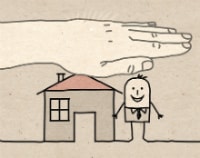 Unlike auto insurance, home insurance has not been made mandatory by the government. If you own the property and have a mortgage on it, often, your bank or lender will require that you hold an active home insurance policy and name them on that policy. If you do not own the property but are renting it, your landlord may require that you have renter’s insurance.
Unlike auto insurance, home insurance has not been made mandatory by the government. If you own the property and have a mortgage on it, often, your bank or lender will require that you hold an active home insurance policy and name them on that policy. If you do not own the property but are renting it, your landlord may require that you have renter’s insurance.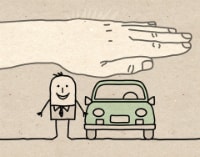 It is, probably, the most classic myth out there. No, the car color is not included in the quoting process and does not impact the price. You can have a red, blue, yellow, black or even pink car – your insurance rates will not be different.
It is, probably, the most classic myth out there. No, the car color is not included in the quoting process and does not impact the price. You can have a red, blue, yellow, black or even pink car – your insurance rates will not be different. Even with some pre-conditions, you can apply for a “rated” traditional life insurance policy (typically more expensive than standard life insurance).
Even with some pre-conditions, you can apply for a “rated” traditional life insurance policy (typically more expensive than standard life insurance).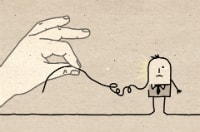 Provincial plans cover many health-related issues but not everything. They would naturally cover many emergency issues but not fully cover regular routine treatments such as dental and hygiene appointments, new glasses etc. A health insurance plan can help to complement your coverage.
Provincial plans cover many health-related issues but not everything. They would naturally cover many emergency issues but not fully cover regular routine treatments such as dental and hygiene appointments, new glasses etc. A health insurance plan can help to complement your coverage.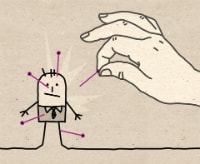 Not at all. The major objective of disability insurance is to substitute your lost income due to your disability. Critical illness insurance provides a lump sump payment if you are diagnosed with a critical illness (e.g. cancer). You can decide how to use these funds. You can pay for your treatment or, if self-employed, compensate yourself.
Not at all. The major objective of disability insurance is to substitute your lost income due to your disability. Critical illness insurance provides a lump sump payment if you are diagnosed with a critical illness (e.g. cancer). You can decide how to use these funds. You can pay for your treatment or, if self-employed, compensate yourself. 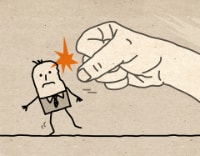 The chances of getting disabled are much higher than chances of getting into a car accident or having your house burned down. There is a 25% chance that a 20-year old person will be disabled during his/her career. I am sure you have home insurance. What is the justification for not having disability insurance?
The chances of getting disabled are much higher than chances of getting into a car accident or having your house burned down. There is a 25% chance that a 20-year old person will be disabled during his/her career. I am sure you have home insurance. What is the justification for not having disability insurance? No, provincial programs such as
No, provincial programs such as 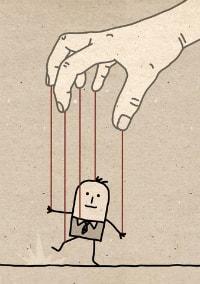 Not necessary. For example, the car insurance industry is tightly regulated and overseen by government bodies. These organizations review insurers requests for changes in rates and decide to what extend these changes can be approved. In some cases, changes are justified. For instance, the average costs of insurance claims go up as cars become more complex and integrated.
Not necessary. For example, the car insurance industry is tightly regulated and overseen by government bodies. These organizations review insurers requests for changes in rates and decide to what extend these changes can be approved. In some cases, changes are justified. For instance, the average costs of insurance claims go up as cars become more complex and integrated.